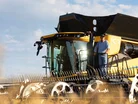Kellanova Supports Regenerative Wheat Agriculture

Kellanova and its partners, Ahold Delhaize USA, Bartlett and Arva Intelligence, were at Climate Week NYC. There, they explored topics around:
- How global food companies can help to build a more sustainable food value chain
- How do they include every part of the supply chain
- What collaboration could look like
Climate Week NYC attendees were able to try Kellanova’s food and hear from wheat farmers involved in its regenerative agriculture pilot programme.
In a first for Kellanova, the programme has a target to highlight the importance of collaboration, education and outcome measurement to lower Scope 3 greenhouse gas emissions, from wheat farming through the value chain. The ultimate goal is to advance farm and supply chain resiliency.
Regenerative agriculture for sustainable snacking
Kellanova has evolved into a leading company in global snacking, international cereal and noodles, plant-based foods and frozen breakfast. With a presence in 180 markets and approximately 23,000 employees, Kellanova has built a portfolio of iconic brands, including Pringles, Cheez-It and Pop-Tarts.
The pilot programme utilises financial investments from Kellanova, Ahold Delhaize USA and Bartlett to advance the adoption of regenerative agricultural practices for wheat farmers.
The wheat which has been harvested and milled from farms in North Carolina, for example, will be used with conventionally grown wheat to manufacture Kellanova’s iconic Cheez-It® crackers. These will be sold at the local brand stores of Ahold Delhaize USA in 2025.
Regenerative agriculture looks at soil conservation and creating a specific farming approach for certain crops, climate and the land in question:
- In Eastern North Carolina, farmers grow regenerative wheat. Bartlett’s certified crop advisors work with these North Carolina farmers, offering technical assistance for implementing conservation practices to support soil health, which improves water quality and helps to minimise emissions.
- Bartlett mixes the regenerative wheat with conventional wheat, then mills it into flour at its Wilson’s Mills facility.
- Kellanova bakes the wheat into Cheez-It® crackers at its facility in Cary, North Carolina.
PepsiCo and Cargill also engage in regenerative farming
Other food giants are engaging in regenerative farming. PepsiCo, a leader in food and beverage, has long been rooted in agriculture, sourcing key ingredients such as potatoes, corn and oats. The company has increasingly focused on sustainable and regenerative agricultural practices.
"I was born on a farm and am proud to work for PepsiCo, a company rooted in agriculture,” said Margaret Henry, Vice President of Sustainable & Regenerative Agriculture at PepsiCo. “I have immense respect for the growers and producers that form the backbone of our country."
Meanwhile, Cargill has partnered with the Soil Health Institute, a non-profit dedicated to soil vitality, to promote regenerative agriculture practices among North American farmers.
“The quality of water directly impacts the health of crops, livestock and the entire agricultural ecosystem”, shared Truke Smoor, Cargill’s global water lead.
Truke says that regenerative agriculture practices contribute to improved soil health.
Cargill's regenerative agriculture programmes have also made significant strides in water conservation. In 2023, these programmes increased water supplies in the company's supply chains by approximately 3.4bn litres and improved water quality by reducing pollutants by over 60 metric tonnes.
******
Make sure you check out the latest industry news and insights at Food Digital.
******
Food Digital is a BizClik brand



